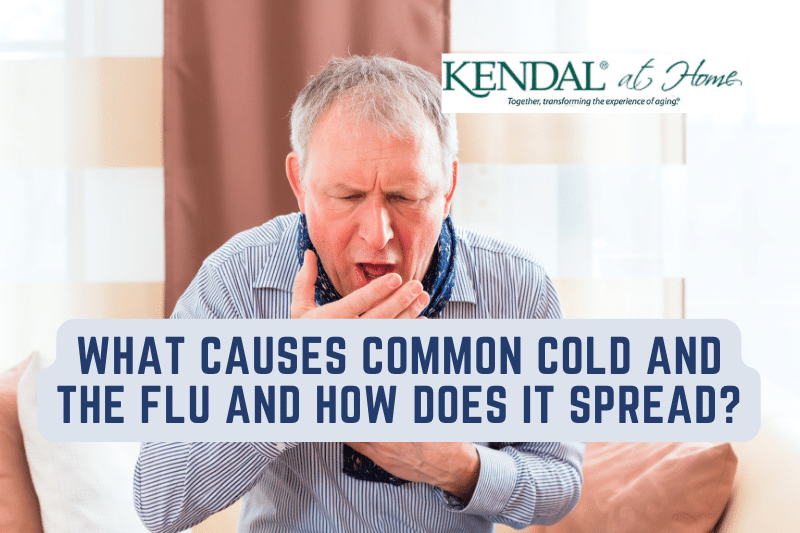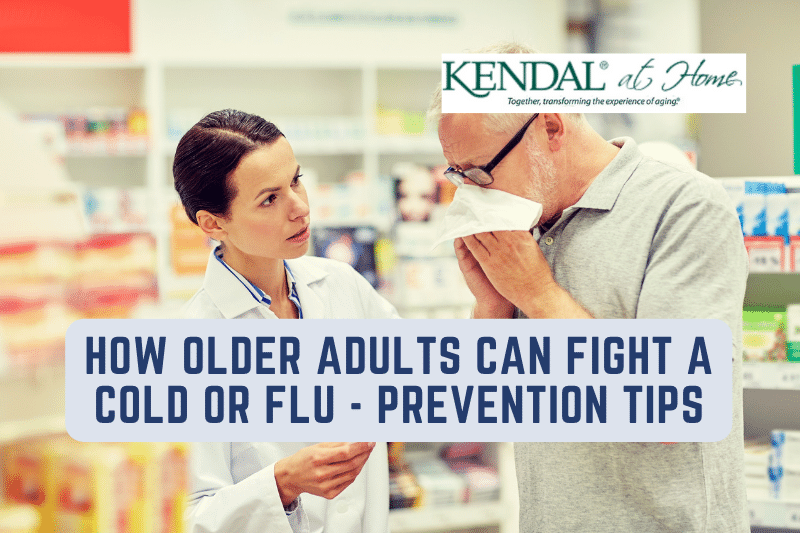So, it's cold and flu season, and here come the fever, chills, cough, sore throat, stuffy or runny nose, headaches, fatigue, and all the other uncomfortable symptoms.
For younger people with generally stronger immune systems, dealing with these symptoms may be easy. However, older people aged 65 and older may find it more challenging.
Dealing with a cold or flu is usually uncomfortable and annoying.
Aside from the aches, fever, fatigue, and a few missed days of activity, these viruses can result in complications leading to hospitalization. But don't worry, this post will teach you simple techniques and coping mechanisms to deal with the flu and stay healthy throughout the season.
Why is the Flu More Dangerous for Older Adults?
As we age, our body system becomes weaker. This means that our organs may not be effective enough to fight off bacteria and viruses that make us sick. Health issues like the flu and cold may not have adverse effects on younger people with a more active system.
Another reason the flu is more dangerous for older people is that as the weakened immune system battles the flu, other health problems like heart disease, diabetes, breathing diseases, etc., may sneak in, making it more complicated.
Healthy habits like getting enough rest, eating a healthy diet, frequently washing your hands, and avoiding those who are sick can help protect against cold and flu viruses.
What Causes Common Cold and the Flu and How Does It Spread?

The flu is caused by influenza viruses. There are different types of influenza viruses, including Influenza A, B, and C, but most human cases are caused by Influenza A and B. These viruses can infect the respiratory system, leading to flu symptoms.
According to the National Council On Aging (NCOA), a common cold can be caused by viruses like coronavirus, rhinovirus, or respiratory syncytial virus (RSV).
Like most viral infections, the flu is highly contagious and can spread from person to person, especially during the flu season, which is typically in the fall and winter. The virus can be spread in several ways, including:
- Coughing and Sneezing: When someone with the flu coughs or sneezes, tiny droplets containing the virus can be released into the air. These droplets can be inhaled by people nearby, and that's how the virus can spread.
- Direct Contact: You can also catch the flu by touching surfaces or objects that have the virus on them, like doorknobs, handrails, or even a tissue an infected person has used. If you touch your face, like your eyes, nose, or mouth, after touching these things, you can introduce the virus into your body.
- Close Contact With Others: Being close to someone who has the flu can also put you at risk. If you spend time with an infected person, especially if they're family or friends, the virus can spread to you through the air they breathe or by touching things they've touched.
- Shaking Hands: You know, shaking hands with someone who has the flu can also transfer the virus.
So, it's a good idea to use good hand hygiene and wash your hands regularly, especially during flu season.
By avoiding these situations, you reduce the risk for flu and also help prevent the spread of the virus and other germs.
What are the Symptoms of Seasonal Influenza and Common Cold
The symptoms of the flu can vary from person to person and not everyone with the flu will experience all of these symptoms. The severity of the symptoms can also vary from mild to severe.
In some cases, the flu can lead to complications from the flu, such as pneumonia, which may cause additional symptoms and can be life-threatening, but typically include a combination of the following:
- Fever
- Chills
- Cough
- Sore Throat
- Runny or Stuffy Nose
- Body Aches
- Headache
- Fatigue
- Weakness
- Shortness of Breath
- Chest Discomfort
- Nausea and Vomiting
- Diarrhea
The symptoms of a common cold are similar to those of the flu. They can include everything above and the following:
- Sneezing
- Watery Eyes
- Mild Muscle Aches
- Slight Soreness of the Body
- Temporary Loss of Taste or Smell
In people with a stronger immune response, these symptoms may resolve within a week or two. However, older adults and those with chronic illnesses are likely to end up in the hospital for these symptoms.
If you've noticed any of these symptoms in yourself or a beloved elderly, don't hesitate to call your doctor and seek help immediately.
How Can Older Adults Prevent Colds and the Flu?

There are several prevention tips to keep you safe during the flu season and throughout the rest of the year. Below are some of them.
1. Stay hydrated
Drinking liquids like water, juice, chicken soup, or lemon water with honey can help you stay hydrated. Drinking plenty of fluids helps loosen any congestion and prevents dehydration. If your throat is sore, munching on ice chips or sipping lemon water with honey can help ease the discomfort.
Your body needs extra fluids to heal during a bout of illness. Even a slight rise in body temperature can increase your metabolism, which means your body will need additional fluids to help with metabolic reactions.
2. Moisturize the air
Your body isn’t the only thing that can benefit from added moisture during a bout of sickness. If you’re congested, adding moisture to the air can help ease congestion. The cooler dry air of winter can often lead to dry, irritated sinuses, noses, and lips.
If you use a humidifier, be sure to keep it clean. Change the water daily and clean it according to the manufacturer’s instructions.
3. Practice Good Hygiene
Bad hygiene puts you at a higher risk of contracting the flu and other related infections. For older people with weaker immune systems, it is particularly dangerous to lead unhealthy lives in dangerous times like the flu season.
Practice washing your hands with soap and water for at least 20 seconds with running water after touching objects in public places or blowing your nose. Avoid touching your eyes or picking your nose with your hands.
4. Limit Your Contact With Sick People
To reduce your risk of contracting the flu, try to avoid being in constant contact with people who are showing signs of the flu or COVID-19 symptoms. Wearing a mask when you're with a group of people or in public places will also reduce your risk of getting the flu.
The Centers for Disease Control and Prevention (CDC) advises people in the U.S. to use a double-layered mask and maintain a distance of at least six feet from other people in public. If you can't avoid people, just stay home whenever you can.
5. Get Supplements
Since older adults are more likely to get the flu because of weaker immune systems, it's a no-brainer to try to prevent the symptoms by improving the system. Get a supplement that boosts the immune system and helps your body combat germs and viruses that make you sick. Some supplements you can try are vitamins B12, C, D, E, calcium, and selenium.
6. Get Flu Vaccination
Getting a flu shot annually can also help you prevent the symptoms of a common cold or the flu. Some of these flu vaccines are designed specifically for older adults and can keep you shielded from the year's flu. Medicare and most private insurance plans will cover the cost of your vaccine shots.
7. Eat Well and Rest Well
According to a study by PubMed Central, people who sleep less than 5 hours every night are 4.5 times more likely to develop a cold or the flu than those who sleep up to 7 hours. Good sleep routines don't only reduce your chances of catching a cold, they also help with your physical and mental health.
8. Know when to go to the doctor
If you have flu symptoms—fever, cough, body aches, chills, and fatigue—the CDC recommends seeking medical care as soon as possible. Prompt medical care helps you stay as healthy as possible, especially if you have other medical conditions and allows you to receive anti-viral drugs, which work best within the first 48 hours of flu symptoms.
Though a cold is milder than the flu, it can still cause complications like sinus infections, bronchitis, ear infections, or even pneumonia. WebMD recommends contacting your doctor if your cold symptoms don’t seem to be improving or you have any of the following symptoms:
- Flu symptoms
- Severe vomiting
- Severe pain in your face or forehead
- Swollen glands in your neck or jaw
You should go to your nearest emergency room if you experience any of these symptoms:
- Pain or pressure in your chest
- Trouble breathing
- Fainting or feeling faint
- Confusion
Practicing healthy habits daily can help protect you from colds and flu, but if you do get sick, keeping yourself hydrated, moistening the air, getting enough rest, and knowing when to seek medical care can protect you from dangerous complications.
What is the Difference Between COVID-19, Cold, And the Flu

COVID-19, the common cold, and the flu are all breathing illnesses, but they are caused by different viruses and exhibit distinct characteristics. COVID-19 is caused by the novel coronavirus SARS-CoV-2, and it has a wide range of symptoms, including fever, cough, loss of taste or smell, and severe breathing issues.
In contrast, the common cold is primarily caused by rhinoviruses and typically leads to mild, upper respiratory symptoms such as a runny or stuffy nose and sore throat, with no or low-grade fever.
The flu, caused by influenza viruses, can cause more severe symptoms like high fever, body aches, and headaches, and it can lead to complications such as pneumonia, particularly in older adults and people with heart problems and other underlying health conditions.
What Should You Do if You Get Sick From Cold and Flu?
If you find yourself sick with a cold or the flu, it's essential to take care of yourself and minimize the risk of spreading the illness to others. Firstly, get plenty of rest and stay hydrated.
Over-the-counter medications like acetaminophen and ibuprofen may help alleviate symptoms, but it's important to ask your doctor for advice if you have underlying health conditions or concerns. Note that the effects of these drugs will come on gradually and will eventually resolve the symptoms if you take the drugs within 48 hours of having the symptoms.
Furthermore, if you are sick with the flu, it's advisable to stay home and avoid close contact with others, including going to work or school, until you have been fever-free for at least 24 hours without the use of fever-reducing medications. If your symptoms worsen consult a healthcare professional for evaluation and guidance.
Final Words
Older adults may take various proactive steps to fight off a cold or the flu effectively. Maintaining a healthy lifestyle through regular exercise and a balanced diet can bolster the immune system's resilience. Staying well-hydrated, getting ample rest, and managing stress are equally vital.
Additionally, practicing good respiratory hygiene, like covering coughs and sneezes, and frequent handwashing can minimize the risk of spreading these illnesses. Combining these strategies and consulting a healthcare professional as needed can help you stay healthy.












